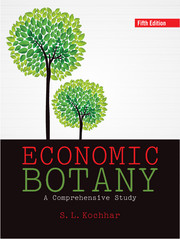Book contents
- Frontmatter
- Dedication
- Contents
- Foreword
- Preface
- Acknowledgements
- 1 Introduction
- 2 Fibres and Fibre Yielding Plants
- 3 Cereal Crops
- 4 Sugars, Starches and Cellulose Products
- 5 Legumes or Pulses
- 6 Vegetable Oils and Fats
- 7 Fruits and Nuts
- 8 Vegetables
- 9 Spices, Condiments and Other Flavourings
- 10 Fumitory and Masticatory Materials
- 11 Beverages
- 12 Wood and its Uses
- 13 Vegetable Tannins and Dyestuffs
- 14 Rubber
- 15 Medicinal Plants
- 16 Insecticides and Herbicides
- 17 Essential Oil Yielding Plants
- 18 Plant Diversity and its Conservation
- 19 Petrocrops: Our Future Fuels
- 20 Ethnobotany: An Integrated Approach
- References
- Index
4 - Sugars, Starches and Cellulose Products
Published online by Cambridge University Press: 08 February 2018
- Frontmatter
- Dedication
- Contents
- Foreword
- Preface
- Acknowledgements
- 1 Introduction
- 2 Fibres and Fibre Yielding Plants
- 3 Cereal Crops
- 4 Sugars, Starches and Cellulose Products
- 5 Legumes or Pulses
- 6 Vegetable Oils and Fats
- 7 Fruits and Nuts
- 8 Vegetables
- 9 Spices, Condiments and Other Flavourings
- 10 Fumitory and Masticatory Materials
- 11 Beverages
- 12 Wood and its Uses
- 13 Vegetable Tannins and Dyestuffs
- 14 Rubber
- 15 Medicinal Plants
- 16 Insecticides and Herbicides
- 17 Essential Oil Yielding Plants
- 18 Plant Diversity and its Conservation
- 19 Petrocrops: Our Future Fuels
- 20 Ethnobotany: An Integrated Approach
- References
- Index
Summary
Carbohydrates are a group of organic compounds containing carbon, hydrogen and oxygen generally in the ratio of 1:2:1.The comparatively high percentage of oxygen makes carbohydrates a less efficient source of energy than fats and oils. They may be divided roughly into three groups; monosaccharides, oligosaccharides and polysaccharides.
Monosaccharides are the least complex of the carbohydrates having a general formula CnH2nOn and cannot be hydrolysed further into simple carbohydrates. They are the building blocks of the more complex oligosaccharides and polysaccharides. Monosaccharides are classed according to the number of carbon atoms they possess; C3H6O3 is a triose, C5H10O5 a pentose, C6H12O6 a hexose and C7H14O7 a heptose. Of all plant monosaccharides, glucose and fructose are the most common.
Oligosaccharides are composed of two ormore molecules of monosaccharidesjoinedbyglycosidic linkages and yield simple sugars on hydrolysis. They are, therefore, called disaccharides, trisaccharides and tetrasaccharides, depending on the monosaccharide units present in them. Sucrose (the condensation product of a fructose and glucose unit) and maltose or malt sugar (the condensation product of two glucose molecules) are two common examples of disaccharides.
Polysaccharides are complex molecules of high molecular weight. They are composed of a large number of repeating monosaccharide units held together by glycosidic linkages and have lost all their sugar properties. The general formula is (CnH2n-2On-i)x. Like disaccharides, they can be broken down into their constituent sugars by hydrolysis. Starch and cellulose (less frequently inulin) are the two most abundant polysaccharides in plants.
Carbohydrates make up the bulk of the dry weight of plants. Although there are many kinds, sugars, starches and the celluloses predominate. Cellulose is insoluble in water and cannot be digested by man, but can be decomposed by microorganisms.
Sugars
It would be difficult to imagine our lives without sugars both as a source of energy and as a sweetening agent. However, all the great civilisations of the past lived without sugar. Neither the Bible, the Talmud nor the Koran contains references to sugar and sugarcane, although honey is mentioned in all of these religious works.
- Type
- Chapter
- Information
- Economic BotanyA Comprehensive Study, pp. 141 - 166Publisher: Cambridge University PressPrint publication year: 2016



